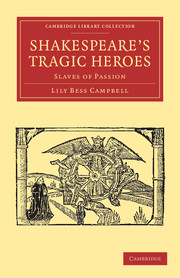CHAPTER THREE
Neo-Classical Interpretations of Tragedy.
Published online by Cambridge University Press: 07 September 2010
Summary
Dryden in The Grounds of Criticism in Tragedy, which he used as a preface to Troilus and Cressida, gave an illuminating summary of the currently accepted idea of the purpose of tragedy:
To instruct delightfully is the general end of all poetry. Philosophy instructs, but it performs its work by precept; which is not delightful, or not so delightful as example. To purge the passions by example is therefore the particular instruction which belongs to Tragedy. Rapin, a judicious critic, has observed from Aristotle, that pride and want of commiseration are the most predominant vices in mankind; therefore, to cure us of these two, the inventors of Tragedy have chosen to work upon two other passions which are fear and pity.
Here there is evidenced the desire so apparent in most seventeenth-century criticism to blend the teachings of the Poetics concerning the katharsis of pity and terror with the more universally recognized doctrine of the function of tragedy as teaching by example. Dryden himself in this same essay crowds rules into a pot-pourri of literary dicta.
'Tis the moral that directs the whole action of the play to one centre; and that action or fable is the example built upon the moral, which confirms the truth of it to our experience; when the fable is designed, then, and not before, the persons are to be introduced, with their manners, characters, and passions.
- Type
- Chapter
- Information
- Shakespeare's Tragic HeroesSlaves of Passion, pp. 39 - 44Publisher: Cambridge University PressPrint publication year: 2009First published in: 1930

